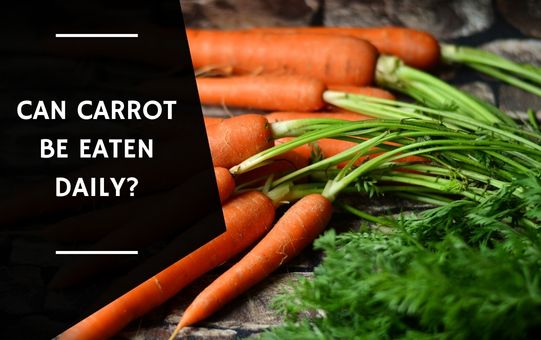While carrots are generally regarded as healthy food, you may wonder if Can Carrot Be Eaten Daily?
Yes, eating carrots daily as part of a balanced diet is generally safe. In addition to vitamin A, vitamin K, and potassium, carrots also contain fiber and antioxidants. However, it is important to be aware of the natural sugars in carrots and the possibility of developing carotenemia if carrots are consumed in large quantities. As with all foods, moderation is essential.
In this article, we will discuss the potential benefits and drawbacks of eating carrots daily, as well as provide suggestions for incorporating carrots into your diet in a variety of ways. So, can carrots be consumed every day? Find out by reading on.
Contents
Why can carrot be eaten daily matter?
Eating carrots daily can be beneficial for your health in a number of ways.
Carrots are a good source of several essential nutrients, including vitamin A, vitamin K, and potassium. These nutrients play important roles in maintaining overall health, including maintaining healthy eyesight, supporting bone health, and regulating heart function. By incorporating carrots into your daily diet, you can help ensure that you are getting enough of these nutrients.
Carrots are a good source of fiber, which can help with digestion and may lower your risk of certain diseases. Fiber helps bulk up the stool and move it through the intestines, which can help prevent constipation and other digestive issues.
Carrots are low in calories and high in fiber, which may make them a helpful food for weight management. However, it’s important to remember that no single food can magically cause weight loss – a healthy, balanced diet and regular physical activity are key to maintaining a healthy weight.
Read Also: Can Carrot Be Eaten At Night?
Nutritional Benefits of Carrots
Carrots are a good source of several essential nutrients, including vitamin A, vitamin K, and potassium. They are also a good source of fiber, which can help with digestion and may lower your risk of certain diseases.
Vitamin A is an important nutrient for maintaining healthy eyesight, and carrots are a particularly rich source of this nutrient. They are also high in antioxidants, which can help protect your cells from damage caused by free radicals.
Vitamin K is important for blood clotting and bone health, and potassium is an electrolyte that helps regulate heart function and fluid balance in the body.
In addition to these nutrients, carrots also contain small amounts of other vitamins and minerals, such as vitamin C, vitamin E, and calcium.
Potential drawbacks of eating carrots daily:
While carrots are generally considered a healthy food, there are a few potential drawbacks to consider if you’re planning to eat them every day.
First, carrots are high in natural sugars, which can contribute to tooth decay if you’re not careful. It’s important to brush your teeth after eating carrots (or any sugary food) to remove any lingering sugars from your teeth.
Second, carrots are high in carotenoids, which are pigments that give carrots their orange color. Consuming large amounts of carotenoids can cause your skin to turn yellow or orange, a condition known as carotenemia. This is generally not a serious condition and can be reversed by reducing your intake of carrots and other carotenoid-rich foods.
Finally, carrots are a member of the nightshade family, which also includes foods like tomatoes, peppers, and potatoes. Some people may have an intolerance to nightshade vegetables, which can cause symptoms like stomach pain and diarrhea. If you experience these symptoms after eating carrots, it’s a good idea to speak with a healthcare provider.

How to incorporate carrots into your daily diet?
Now that we’ve covered the nutritional benefits and potential drawbacks of eating carrots every day, let’s talk about how you can incorporate them into your diet. Here are a few ideas:
- Snack on carrot sticks: Cut carrots into thin sticks and keep them in the fridge for a quick and healthy snack. You can also try dipping them in hummus or another healthy dip for added flavor.
- Add carrots to salads: Grate or shave carrots and add them to your favorite salads for a crunchy, sweet addition.
- Use carrots in soups and stews: Carrots add flavor and nutrition to soups and stews. Try grating or dicing them and adding them to your favorite recipes.
- Roast carrots: Roasting carrots brings out their natural sweetness and makes them a delicious side dish. Simply chop carrots into chunks, toss with a little olive oil and your favorite herbs and spices, and roast in the oven at 400 degrees Fahrenheit for about 20-25 minutes.
- Make carrot juice: If you have a juicer, you can make fresh carrot juice at home. Simply wash and chop carrots, then run them through the juicer. You can also add other vegetables or fruits to your carrot juice for added flavor and nutrition.
- Bake with carrots: Carrots can be used in a variety of baked goods, such as carrot cake, muffins, and bread. Grate carrots and add them to your favorite recipes for a nutritious twist.
Tips for storing and preparing carrots
Here are a few tips for storing and preparing carrots:
- Store carrots in the refrigerator: Carrots can be stored in the refrigerator in a plastic bag or wrapped in a damp paper towel to keep them fresh. They will last for about a week to 10 days this way.
- Wash carrots before using: Before using carrots, be sure to wash them thoroughly to remove any dirt or contaminants. You can use a vegetable brush to scrub the carrots if needed.
- Peel carrots if desired: Some people prefer to peel carrots before using them, as the skin can be tough and bitter. If you do choose to peel carrots, be sure to use a vegetable peeler or paring knife to remove the skin carefully.
- Cut carrots into even slices or chunks: Depending on how you plan to use the carrots, you may want to cut them into even slices or chunks. This will help them cook evenly and make them easier to eat.
- Cook carrots to your desired tenderness: Carrots can be cooked in a variety of ways, including boiling, roasting, grilling, and sautéing. Cook them until they are tender to your liking – some people prefer softer carrots, while others like them to have a little crunch.
- Season carrots to taste: Carrots are naturally sweet, so they can be eaten plain or seasoned to taste. Try adding herbs, spices, or a drizzle of olive oil and lemon juice to carrots for added flavor.
Read Also: Are Raw Carrots Good For You?
Conclusion
Carrots can be a healthy and tasty addition to your daily diet. They are rich in nutrients like vitamin A, vitamin K, and potassium, and they contain fiber and antioxidants. However, it’s important to be mindful of the natural sugars in carrots and the potential for carotenemia if you consume large amounts of them.
There are many ways to incorporate carrots into your diet, including snacking on carrot sticks, adding them to salads, using them in soups and stews, roasting them, making carrot juice, and baking with them. As with any food, it’s important to eat carrots in moderation as part of a balanced diet.
FAQs | Can carrots be eaten daily?
Here are a few FAQs on the topic can carrots be eaten daily?:
Is It Safe To Eat Carrots Every Day?
Generally speaking, it is safe to eat carrots every day as part of a balanced diet. Carrots are a good source of several essential nutrients, including vitamin A, vitamin K, and potassium, and they contain fiber and antioxidants.
However, it’s important to be mindful of the natural sugars in carrots and the potential for carotenemia if you consume large amounts of them. As with any food, moderation is key.
Can Carrots Be Eaten Raw Or Do They Need To Be Cooked?
Both raw and cooked carrots can be part of a healthy diet. Raw carrots are crunchy and make a great snack, while cooked carrots can be softer and easier to digest.
Some people may find that cooked carrots are more flavorful, as the heat brings out their natural sweetness. You can try both raw and cooked carrots to see which you prefer.
Can Eating Too Many Carrots Cause Health Problems?
Eating too many carrots can lead to a condition called carotenemia, which is characterized by yellow or orange skin due to the accumulation of carotenoids (pigments found in carrots and other orange-colored fruits and vegetables).
This condition is generally not serious and can be reversed by reducing your intake of carrots and other carotenoid-rich foods. However, it’s important to remember that carrots should be consumed in moderation as part of a balanced diet.
Can Carrots Be Harmful To People With Certain Health Conditions?
Carrots are generally considered a healthy food and can be safely consumed by most people. However, if you have a specific health condition, it’s always a good idea to speak with a healthcare provider before making any changes to your diet.
For example, people with high levels of vitamin A in their body or those taking certain medications may need to be careful about their intake of carrots and other sources of vitamin A.
How Can I Incorporate Carrots Into My Daily Diet?
There are many ways to incorporate carrots into your daily diet. Some ideas include snacking on carrot sticks, adding grated or shaved carrots to salads, using carrots in soups and stews, roasting them, making carrot juice, and baking with them.
You can also try adding carrots to smoothies or blending them into dips like hummus. Experiment with different ways of preparing carrots to see what you like best.

